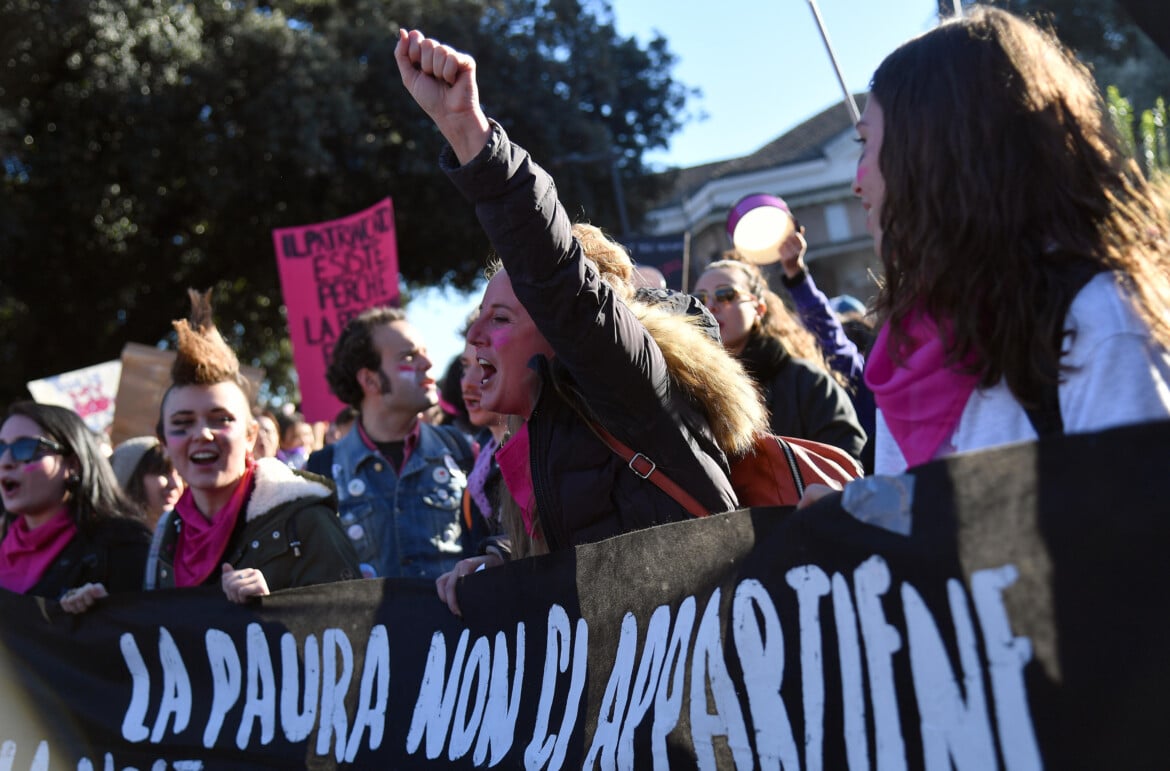Reportage
200,000 from Non Una Di Meno marched on Rome a year after Giulia Cecchettin
‘Violence is political, and this is a patriarchal government. A woman prime minister is not enough.’

There was one lingering question left from last year: was the enormous success of last year's demonstration protesting violence against women due solely to the wave of emotion that had arisen over the femicide of Giulia Cecchettin? A year later, that worry proved unfounded.
The transfeminist march convened in Rome by Non Una Di Meno last month saw at least 200,000 people march in support of a political and economic platform that goes above and beyond particular events in the news and gives them new meaning. “Violence is political, and this is a patriarchal government. A woman prime minister is not enough,” explained NUDM activists at the start of the march, in front of the Pyramid of Cestius.
People continuously trickled in: women and men of all ages, children and young people. The square, which at first seemed too large, filled up. Certainly, a strong push for many to attend (albeit unintentional) was caused by Education (“and Merit”) Minister Valditara and Prime Minister Meloni, who doubled down on the former’s inappropriate, xenophobic and denialist speech at the presentation of the Cecchettin Foundation last Monday.
It was only natural that the bulk of the ironic and irreverent signs were dedicated to them: “Patriarchy exists. Institutional racism is not the answer” summed up the marchers’ response to Valditara. But there was more: “We are marching against the Orbanization of society, against the Security Bill that carries out the criminalization of life choices and dissent and the militarization of the territory while the economic crisis wreaks havoc, against being employed but poor and the compulsory part time work for women that has reached a new record with Meloni, against the government that makes cuts to welfare, health and schools to finance rearmament,” they denounced.
“104 deaths caused by the state. It’s not immigration, it’s your education,” read the banner of the middle school student collectives arriving en masse after organizing a flash mob in front of the Ministry of Education on Viale Trastevere, where they had burned a photo of the Lega minister: a gesture that was immediately seized on by the majority as a pretext to try to cast the whole march as violent and to demand that the center-left parties distance themselves from it. It was yet another sign that the government simply cannot comprehend a feminist mobilization that was not convened by any party, but by a wide-ranging network of NGOs, anti-violence centers, collectives and youth centers.
Among the marchers, one could see the banners of Be Free, Differenza Donna, Lucha y Siesta, Giuridicamente Libera, the International House of Women, Scosse della Rete degli Studenti Medi, Aracne. The CGIL union and Nonna Roma were also present. There were also a number of politicians from the center-left, but without any party symbol. “It’s everyone’s march,” explained PD Senator Cecilia d'Elia.
The march set off behind the first truck, wrapped in a giant banner displaying a quote by Gisèle Pélicot, whose husband is on trial in France for raping her and having dozens of other men rape her: “Shame must change sides.” Mara, a retired teacher, was keeping her distance, hiding behind a tree to peek at her granddaughter, who was at the march with her classmates, “If she sees me, she might be embarrassed,” she said, “but I am so proud and I want to take a picture of her.” A group of men looked out from a building in Piazzale Ostiense, waving feminist signs amid applause from people on the street. Actors from the Una Nessuna e Centomila foundation arrived as well: Paola Cortellesi, Vittoria Puccini, Maria Chiara Giannetta, among others.
Also part of the march was a group of scouts carrying Palestine flags. They came from a Roman parish to join and demonstrate against genocide as well. Just like last year, Palestine is one of the central points of the platform on which the march was called. Throughout the human river winding through the center of Rome, the colors of the Palestine flag mingled with the fuchsia and purple of the feminists. Arriving in front of the FAO headquarters, thousands of marchers jingled their keys in unison, both as a sign that those who commit femicide often have the keys to the house and also against “the complicit silence of Western governments on the massacre of the Palestinian population. Women are a prime target.”
Fiamma and her friends are civil servants. Each is wearing a keffiyeh, “but mine is an original one,” Fiamma points out, “I wore it back in the 1970s.” She says that the young women are right: “war is the result of patriarchy.”
The second stop of the marchers was at the Colosseum, where an enormous list was rolled out with the names of the 106 victims of femicide, lesbicide and transicide in the past year. “The media is biased because it overlooks the cases when the victims are elderly women, trans women or migrants,” an activist accused on the megaphone. “We are demanding a stop to this vicious culling.”
Valentina has brought her 5-year-old son; she stops to look for her friends who came from Pisa with their little girls. They were not perturbed when there seemed to be a tense moment with law enforcement, when the marchers reached the headquarters of the Pro Vita anti-abortion organization. “We're not worried, it's a beautiful celebration,” they said as they all headed towards Piazza Vittorio, where the enormous march finally arrived after many hours.
Originally published at https://ilmanifesto.it/meloni-il-patriarcato-esiste-200-mila-al-corteo-femminista on 2024-11-24
